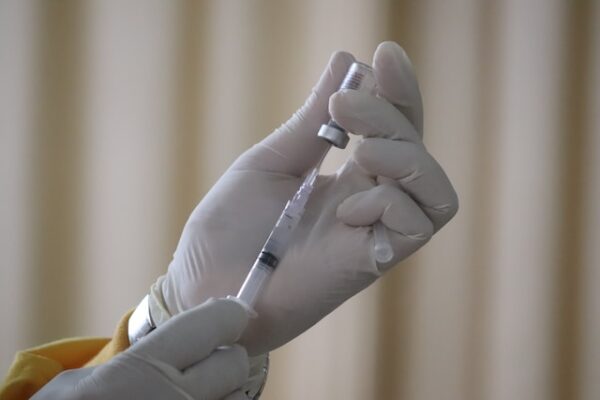In 2021, Leo Politella’s parents were specifically assured by their local Vermont public school officials that their 6-year-old son would not be vaccinated with a novel Covid-19 vaccine at an upcoming school clinic. Leo’s father visited the school the week before to ask whether he should keep his son home the day of the vaccination clinic but was told he had nothing to worry about. He was not told that the school was competing with other public schools for cash “awards” from the state of Vermont based on rates of vaccination.
Leo was vaccinated against his will at the school’s clinic the next week. He was given a name tag for another child (not in his grade or class), and when he vocally protested that he was not supposed to be vaccinated, he was told he had to have a shot. Workers distracted him with a toy and jabbed him.
If the school administrators were aware of the error, they didn’t inform the family. Leo’s mother, Shujen, was told by her young son he had been vaccinated and later saw the band-aid on his arm as proof. When Shujen visited the school to inquire, she was met with a lack of accountability. No one explained how this could have happened, and the school could not even state who was in charge of the clinic and responsible for what happened to Leo. Other questions are obvious: how did he get the wrong name tag? How did the child whose name was on the tag avoid being vaccinated twice? How does such a thing happen unless it is deliberate?
Like many parents struggling to make important healthcare decisions during the Covid-19 pandemic, the Politellas felt marginalized when they decided to decline the shot for Leo. Centers for Disease Control and Prevention data show clearly that healthy young children are at very low risk from Covid-19, and there is no evidence to show that vaccinations of children prevent transmission. (This is more clear now than in 2021 when these events occurred.) Could it be that school officials were retaliatory toward this little boy, or were they simply grossly incompetent and then callous afterward?
Understandably, Tony and Shujen immediately took their child out of public school and enrolled him in a private school they could trust. They filed suit in Vermont state court, but the Vermont Supreme Court later ruled they had no legal legs to stand on – they are barred from suit because of federal protections not of public schools who betray parental trust, but because of product liability immunity provided to vaccine manufacturers under the federal PREP Act.
This ruling is unconscionable. The Vermont Court did not rule that teachers and school workers can do whatever they want to others’ young children, but that is the legal effect of this abhorrent decision. Much like shoplifting isn’t technically “legalized” simply because it is not prosecuted, the effect is the same – teachers and school staff can act with complete impunity when administering experimental vaccines for Big Pharma! Only if a child suffers death or serious bodily injury could they then be held responsible – under the PREP Act only, and only for harm from the shot and not the harm of having administered it against the patient’s and his parents’ specific directions. No recourse for the intentional tort (wrong) of jabbing somebody else’s kids is allowed.
The US government has a record of violating citizens’ liberties, including exposing civilians and servicemembers to radiation, toxic chemicals, nerve agents, pharmaceuticals, and pathogens. Excusing school authorities from accountability for sloppy or even malicious conduct in medical care for children creates a bureaucratic moral hazard.
Americans desire and deserve public servants and medical providers they can trust to tell them the truth about the drugs they are prescribed – especially if experimental. Doctors and pharmacists were paid cash bonuses linked to the percentage of their patients who received Covid-19 vaccines. So did Vermont’s public schools: Vermont Governor Phil Scott awarded cash payments to public schools that achieved high vaccination levels.
The seminal US Constitutional decision addressing mandatory vaccination is Jacobson v. Massachusetts, a 1905 ruling that approved compulsory smallpox vaccines. The Jacobson court foresaw the possibility that the government was not always trustworthy:
Before closing this opinion, we deem it appropriate, in order to prevent misapprehension as to our views, to observe – perhaps to repeat a thought already sufficiently expressed, namely – that the police power of a State, whether exercised by the legislature or by a local body acting under its authority, may be exerted in such circumstances or by regulations so arbitrary and oppressive in particular cases as to justify the interference of the courts to prevent wrong and oppression. Extreme cases can be readily suggested….
The Vermont Supreme Court did not interfere to prevent wrong and oppression against the Politella family – on the contrary, it interposed federal law immunizing vaccine manufacturers to instead immunize incompetent or corrupt school employees to permit wrong and oppression. How does Vermont’s ruling guard against the “extreme cases” of abuse referenced in Jacobson, and subsequently witnessed in the Tuskegee experiments and forced sterilizations of the eugenics movement?
As Associate US Supreme Court Justice Sandra Day O’Connor emphasized in her dissenting opinion in U.S. v Stanley:
….the standards that the Nuremberg Military Tribunals developed to judge the behavior of the defendants stated that the ‘voluntary consent of the human subject is absolutely essential….to satisfy moral, ethical, and legal concepts.’ If this principle is violated, the very least that society can do is to see that the victims are compensated, as best they can be, by the perpetrators.
The Vermont public school system violated this fundamental principle, and the Vermont Supreme Court saw to it that the perpetrators escaped all accountability and that the victims were shut down. This is how all public school children can be treated if Vermont’s Politella decision is allowed to stand.
The family tells their story here.
